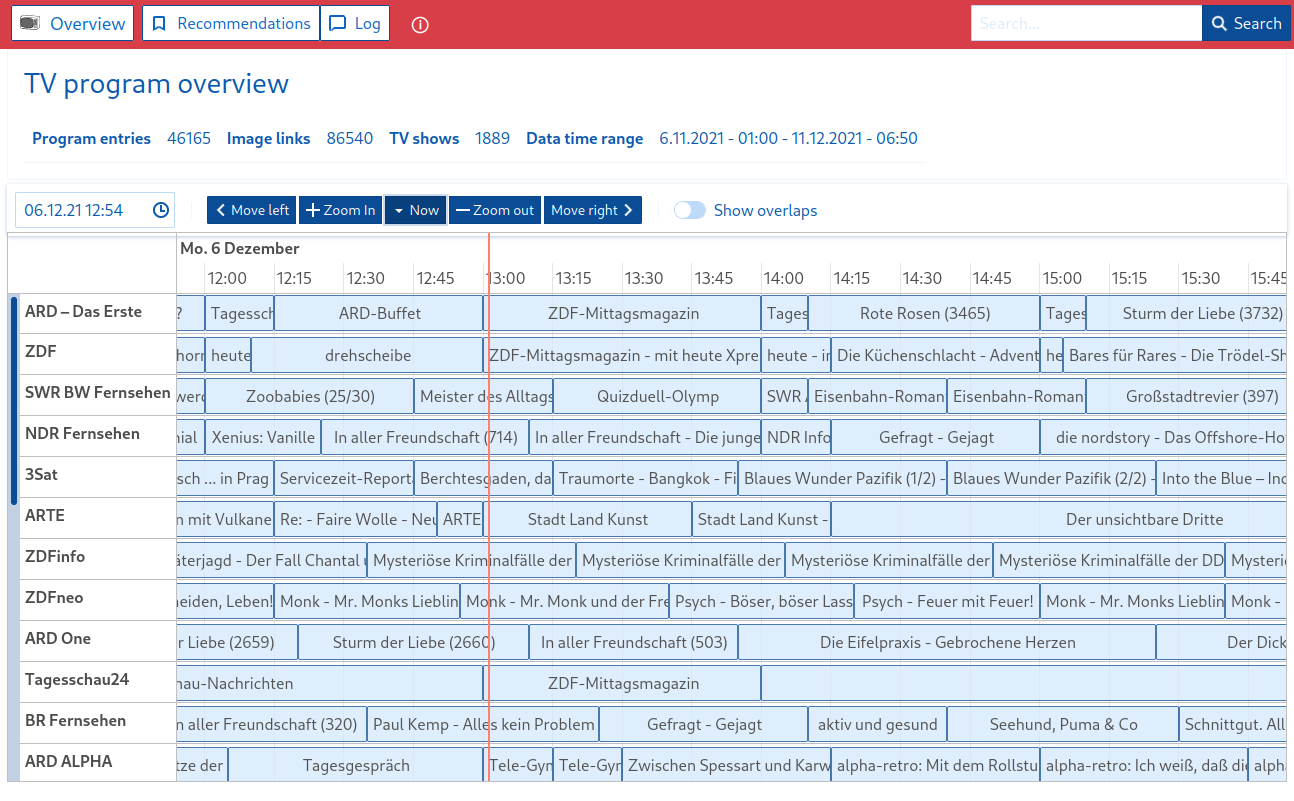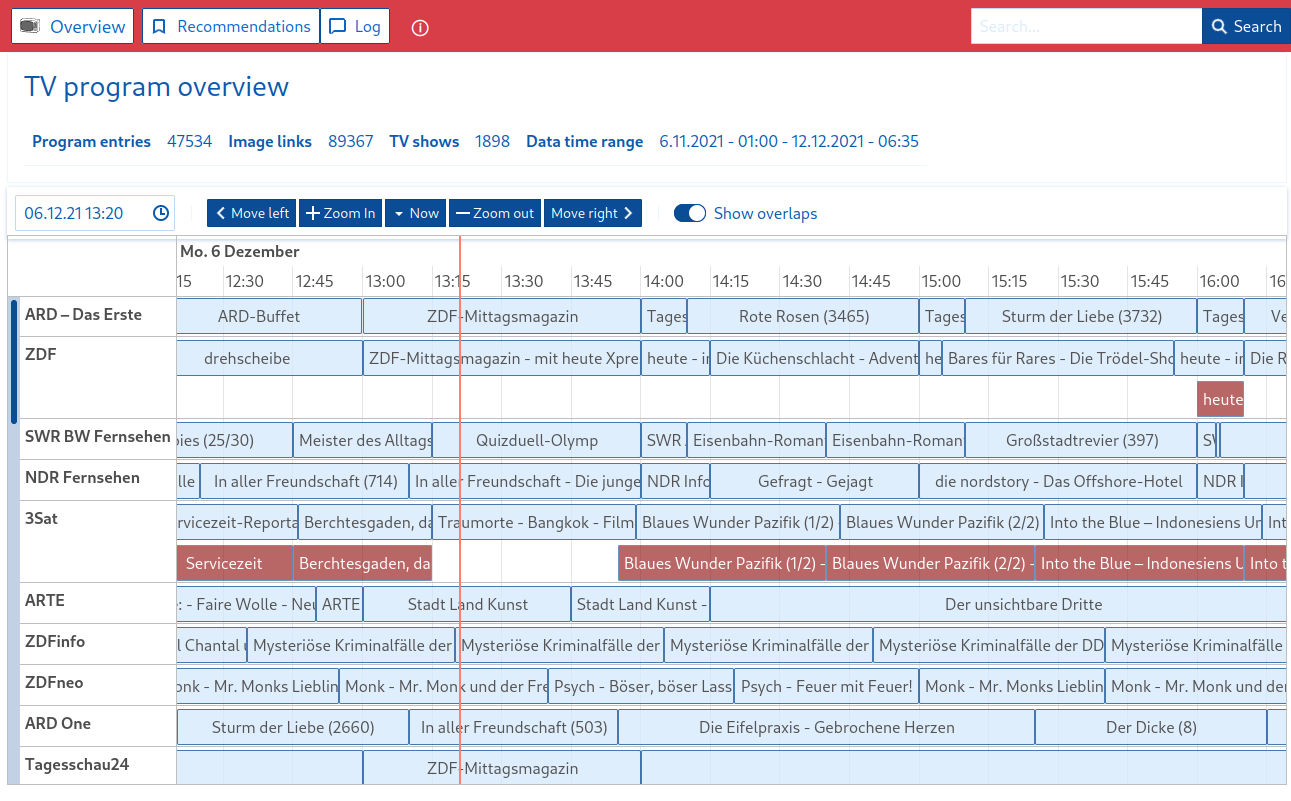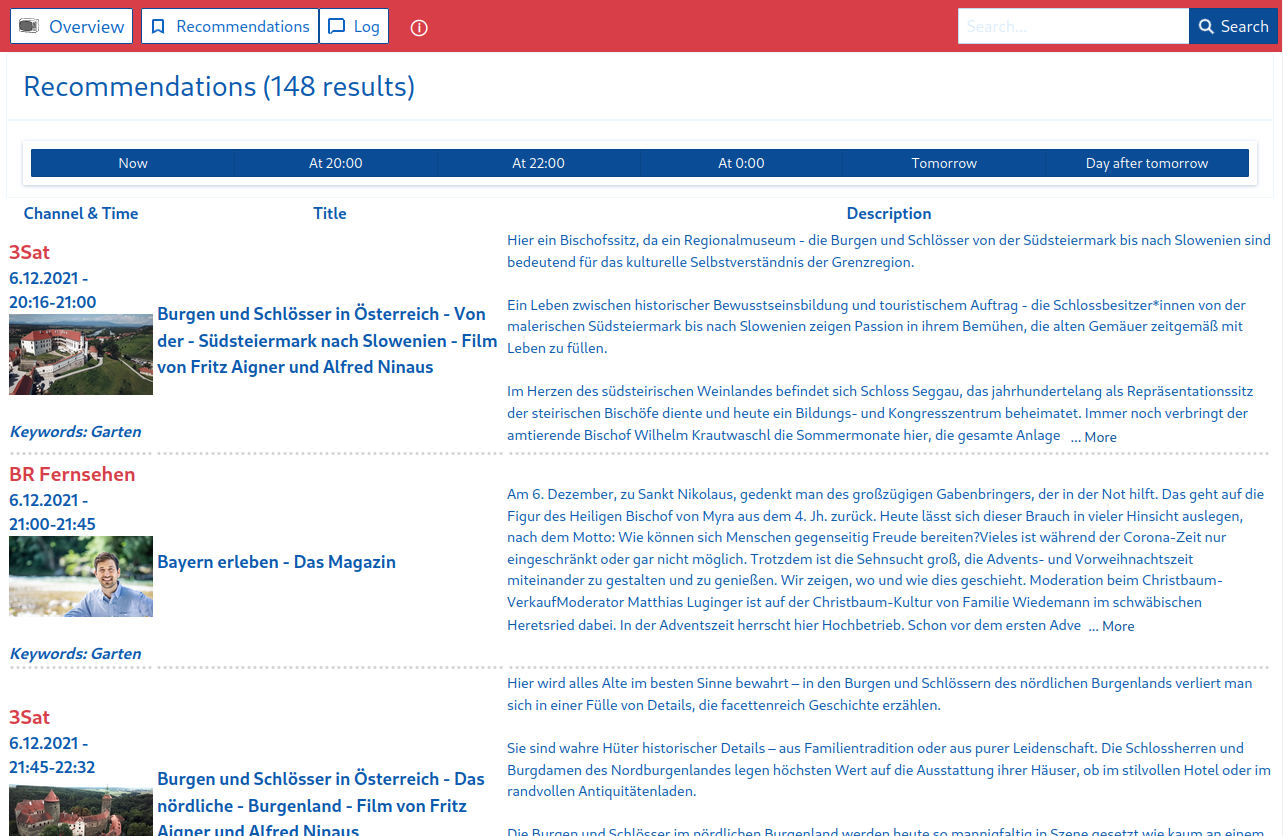... is a software project to locally store, view and search the program data of public-law ("öffentlich-rechtliche") TV stations in Germany, Austria and Switzerland.
oerc needs a single PostgreSQL database and some configuration options to get ready.
While oerc is a command-line tool only, a built-in web application is provided for you
at 127.0.0.1:8080 (default) if you run oerc server.
- Collecting TV program data of 28 TV channels (
oerc fetch) - Search for interesting program items by looking for your own keywords (
oerc search) - Running an HTTP server to access program data in a simple Web-UI (
oerc server) - By default, the server contains a small client web application for your browser to view the program data and your personal program recommendations
With the help of oerc you can build and use your own private TV program recommendation tool while ALL
information is processed and kept locally.
This project is written in Golang, and it is AGPL v3 licensed. You are encouraged to participate and improve functionality. Just create a GitHub issue!
The focus of this project lies in providing program data for individuals - ready to be enriched, searched or analysed as long as there is no (real) Open Data policy of the public-law sector.
At the moment it's not intended to create links between program data and Media(thek) information. If you are looking for this have a look at similar projects.
Note 1: This server and client software is not ready to be used directly in the internet without further changes. It is recommended to use it locally only or in protected environments and don't expose it to the internet.
Note 2: Unfortunately the public-law web pages this software needs to access are restricted to certain geographic IP regions in general.
Current software quality: Beta
Download the oerc binary from here for your platform,
make it executable, and you are ready to start.
Clone this repository, and build the binary file for the container:
$ CGO_ENABLED=0 ; GOOS=linux ; GO111MODULE=on go build -o bin/oerc-release -ldflags "-s -w"Then:
$ docker-compose build
$ docker-compose up- To obtain this application use the following command
go install github.com/emschu/oerc@latest- Set up a PostgreSQL database (12+), configure a database with a user and start it.
- The development section contains a simple docker command to run a local database for development and
- Run
oerc init.- This will copy a sample configuration file to the path
~/.oerc.yaml- if the file does not exist already. You have to change some of the values in order to getoercto work, at least you have to replace<db_name>,<db_user>,<db_password>in the configuration file to reach the database you've configured in the previous step.
- This will copy a sample configuration file to the path
- Run
oerc fetchfor the first time and wait until the first program data is collected for you. - Run
oerc serverto have a browser application athttp://localhost:8080/client(the endpoint is configurable). - Run
oerc searchto look for recommendations based on your self-defined keywords in the configuration.
NAME:
oerc - Command line tool to manage the oerc application
USAGE:
oerc [global options] command [command options] [arguments...]
VERSION:
0.16.0, License: AGPLv3, https://github.com/emschu/oerc
DESCRIPTION:
Fetch, view and search TV program data of public-law stations in Germany, Switzerland and Austria
COMMANDS:
clear Clear the database. Be careful!
fetch, f Get latest data
fetch-range, fr Fetch a specific date range
full-overlap-check Run overlap check on all program entries. Could take very long.
init, i Initial database and configuration setup check
overlap-check Run overlap check on currently fetched time range
search, sc Search program data and create recommendations
server, sv Start webserver with oerc API and an embedded browser client
status, s Show some of the app's status information
help, h Shows a list of commands or help for one command
GLOBAL OPTIONS:
--config value, -c value Path to the yaml configuration file (default: ~/.oerc.yaml)
--verbose Verbose log output (default: false)
--help, -h show help (default: false)
--version, -v print the version (default: false)
The following preferences are important to understand your possibilities to control this software.
You can find this file here and if you run oerc init this file will be created at
~/.oerc.yaml for you. You must provide valid postgres database connection details.
If you don't want to put your configuration at the user's home directory, you can also use the
-c <path-to-your-oerc>.yaml
argument for all oerc commands.
# db settings
DbType: postgres
DbHost: localhost
DbPort: 5432
DbName: <db_name>
DbSchema: public
DbUser: <db_user>
DbPassword: <db_password>
DbSSLEnabled: false
# general fetch settings
ForceUpdate: false
# don't update entries which were processed already in the last 6 hours
TimeToRefreshInMinutes: 360
# if you run "oerc fetch" the last 2 and the next 7 days of program data will be fetched
DaysInPast: 2
DaysInFuture: 7
# enable/disable channel families
EnableARD: true
EnableZDF: true
EnableORF: true
EnableSRF: true
EnableProgramEntryCollection: true
EnableTVShowCollection: true
# provide a full URL to a HTTP(S) or SOCKS proxy or it will fail
ProxyUrl:
TimeZone: Europe/Berlin
# backend server settings
ServerHost: 127.0.0.1
ServerPort: 8080
# client server settings
ClientEnabled: true
# search settings
# only search for recommendations in the next 4 days
SearchDaysInFuture: 5
# these are example values. Feel free to create your own list of keywords :)
SearchKeywords:
- Loriot
# these channels won't be recognized during the "search" for recommendations based on your keywords
SearchSkipChannels:
- KIKA
- ORF Sport +
Debug: false
AccessControlAllowOrigin: "http://127.0.0.1:8080"After installing oerc and setting it up, you should run at least one time the oerc fetch command.
It is recommended to update the program data regularly, e.g. daily, by using a (unix) cron job which
runs oerc fetch
and oerc search.
While it is possible to run oerc server in a user session, you should consider to create a systemd
service to run and control the web server (backend + frontend) in the background persistently.
The following systemd service file is a simple example to integrate oerc with systemd in a Linux system:
oerc.service:
[Unit]
Description=oerc service
After=network.target
[Service]
Type=simple
ExecStart=<path_to_oerc_bin> server
StandardOutput=journal
KillMode=process
[Install]
WantedBy=multi-user.target
Note: You must replace <path_to_oerc_bin> with an absolute path to the oerc binary (which oerc).
Copy the modified system service templates to your systemd services directory, e.g. /etc/systemd/system, and reload the
systemd daemon by executing
$ sudo systemctl daemon-reload.
After the last command you can use
$ sudo systemctl [start|stop] oerc
to start (or stop) the services.
To (not) start the service on boot, type
$ sudo systemctl [enable|disable] oerc.
If you enable both services by default, please keep in mind that the PostgreSQL database needs to be available too, so ensure to enable the postgres database service as well.
Channels: ARD, ZDF, 3Sat, ARTE, ZDFInfo, ZDFNeo, Phoenix, KiKa, ARD One, Tagesschau24, ARD Alpha, SWR RP Fernsehen,WDR Fernsehen, SWR BW Fernsehen,SR Fernsehen, Radio Bremen TV, RBB Fernsehen, NDR Fernsehen, MDR Fernsehen, HR Fernsehen, BR Fernsehen, ORF eins, ORF 2, ORF III, ORF Sport +, SRF-1, SRF-zwei, SRF-info.
| Channel family | Earliest date | Latest date |
|---|---|---|
| ARD | ~ 2010/01 | Today + 6 weeks |
| ZDF | 2015/03 | Today + 6 weeks |
| ORF | Today - 14 days | Today + 22 days |
| SRF | Today - 14 days | Today + 29 days |
- This project is non-commercial.
- Private/commercial sector TV or radio stations will never be part of this project.
- This project shall be an instrument mainly to analyze the program and constructively improve public-law TV and radio stations. Or just use it privately.
- This project would be superfluous, if there was a public API for public data, OpenData...
- Minimise traffic and external load to the least needed.
- Avoid security problems on the client side and maintain privacy of the users.
- All parts of the software should work on "low-resource" platforms, e.g. a Raspberry Pi 3b+
If you run the (backend) server (oerc server) an OpenApi 3 specification is shipped at
http://localhost:8080/spec/openapi3.json, respectively .yaml. Or have a look at the
API specification files in this directory.
This project is licensed under GNU Affero General Public License 3.
oerc, alias oer-collector
Copyright (C) 2021-23 emschu[aet]mailbox.org
This program is free software: you can redistribute it and/or modify
it under the terms of the GNU Affero General Public License as
published by the Free Software Foundation, either version 3 of the
License, or (at your option) any later version.
This program is distributed in the hope that it will be useful,
but WITHOUT ANY WARRANTY; without even the implied warranty of
MERCHANTABILITY or FITNESS FOR A PARTICULAR PURPOSE. See the
GNU Affero General Public License for more details.
You should have received a copy of the GNU Affero General Public
License along with this program.
If not, see <https://www.gnu.org/licenses/>.
- Urfave/cli v2 – CLI is a simple, fast, and fun package for building command line apps in Go.
- Gorm – The fantastic ORM library for Golang
- Colly – Fast and Elegant Scraping Framework for Gophers
- Gin – Gin is a HTTP web framework
- Bluemonday – A fast golang HTML sanitizer
This project is shipped with a Makefile to ease the development and testing process.
At first you should run make setup and you need the usual Golang/Python/Node/Java toolchains.
Be sure to run make build and make spec (if you updated something there) before filing a pull request.
# docker run --name oer-postgres -p 5432:5432 -e POSTGRES_PASSWORD=root -e POSTGRES_DB=oer_server_dev -d postgres:14-alpine - File issues on GitHub to request and discuss new features or bugs there.
- You need a new feature/improvement? -> File an issue.
- Contribute code through pull requests or submit patch files.



